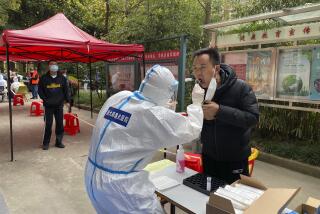Illness May Slow Trade With China
- Share via
The severe acute respiratory syndrome virus is beginning to disrupt California’s commerce with Asia.
Technology companies, toy importers and furniture firms are monitoring employee health in their Asia offices, canceling trips and doing business by videoconference as the spread of the illness casts a pall over China, the state’s fourth-largest export market.
Although it’s too early to gauge the economic ramifications of the outbreak of the virus known by the acronym SARS, it could do substantial harm to Pacific Rim trade if the crisis spreads, said Robert Kapp, president of the U.S.-China Business Council in Washington.
The disease has infected nearly 2,000 people in 17 countries, killing at least 62. On Tuesday, American Airlines detained a planeload of travelers from Tokyo at the San Jose airport after four people -- two passengers and two crew members -- exhibited signs of the illness.
The virus could be “a very significant problem for business throughout the region and potentially worldwide because of the uncertainty” over how it is spread and the lack of information provided by the Chinese government, Kapp said.
Andy Xie, a prominent Hong Kong economist, warned this week that SARS could push several Asian countries into recession and put a damper on foreign investment in China if it is not contained within a few months.
So far, the most dramatic effect has been on travel-related industries such as airlines, hotels and tour agencies on both sides of the Pacific. Singapore Airlines cut 60 flights Tuesday, including two from Los Angeles to Singapore, joining Cathay Pacific Airways of Hong Kong and Air New Zealand, which had pared flights to the region.
And the airlines’ troubles could grow. The Business Travel Coalition, an advocacy group for business passengers, said Tuesday that its poll of 180 companies and organizations showed that more than a third had banned employees’ travel to Asia -- especially Hong Kong, Singapore and China -- or were considering such restrictions.
Across California’s trade-dependent economy, companies were weighing the risks Tuesday of business as usual against the potential threat to their employees, customers or suppliers. Any disruption to trade with China could have serious ramifications for the state’s leading industries, from entertainment to agriculture.
Walt Disney Co., which is building a theme park in Hong Kong, issued an advisory urging employees to evaluate all nonessential travel. Leslie Goodman, a spokeswoman for Walt Disney Parks & Resorts, said Disney does not expect the SARS outbreak to affect the Hong Kong Disneyland project, which is under construction and set to open by 2006.
China is one of the fastest-growing markets and a key supplier for U.S. technology firms.
Intel Corp., which has more than 15,000 workers in Asia, said an employee in its Hong Kong sales and marketing office came down with SARS-like symptoms this weekend, but has not been definitively diagnosed. The company asked those who had worked on the same floor as the employee to telecommute this week. It also restricted travel to Asia, requiring workers to limit travel to “mission-critical business” and obtain management approval before traveling.
At chip maker Microsemi Corp. in Irvine, employees considering international travel outside their base of operation were told they had to get the OK of Chief Executive James Peterson and a letter of approval from their family.
“Jim Peterson is a strong, family-oriented guy,” said spokesman Clifford Silver, when asked about the decision to include family members in its travel planning.
In the toy industry, where executives, designers and production managers regularly travel to manufacturing facilities across Asia, many firms were quick to put travel restrictions in place.
Normally, Los Angeles importer Megatoys Inc. sends a large group to Hong Kong and China for the giant Guangzhou Trade Fair in mid-April. This year, no one from Megatoys will be there, said company President Charlie Woo.
In addition, Woo’s 12 Hong Kong-based executives and other associates are avoiding coming to the United States. “They are concerned that people would not treat them right or want to meet them,” he said. “If you’re from Hong Kong and you cough in front of someone here, they get sensitive.”
Mattel Inc. of El Segundo and Pawtucket, R.I.-based Hasbro Inc. also have restricted travel to the Far East.
Tony Luh, the managing director of Palo Alto-based DragonVentures, a consulting and venture fund that invests in China, canceled a trip to Hong Kong this week where he was to have met with a large California company and a group of Asian investors. Instead, they conducted the meeting by phone Tuesday.
SARS became an issue when Luh took a group of U.S. furniture executives to Taiwan and China last month. After a couple of sleepless nights in Taipei, 10 of the group’s two dozen members decided not to continue on to Guangzhou, the center of China’s furniture production. Medical experts think that the virus may have started in that region.
Luh led the remaining travelers on their tour of factories and trade fairs, though not without a high degree of trepidation. He armed the group with respiratory masks equipped with charcoal filters.
“I told everybody to try and avoid hand contact and crowded places,” he said, not an easy feat in the world’s most populous nation. So far, there are no reports of illness among his returning delegates.
“I’ve passed my incubation period; that was yesterday,” said Jean Reynolds, president of Seattle-based Maxon Furniture Inc., who traveled with Luh.
Times staff writers Abigail Goldman, Jon Healey, James F. Peltz, Alex Pham and Richard Verrier contributed to this report.
More to Read
Inside the business of entertainment
The Wide Shot brings you news, analysis and insights on everything from streaming wars to production — and what it all means for the future.
You may occasionally receive promotional content from the Los Angeles Times.










